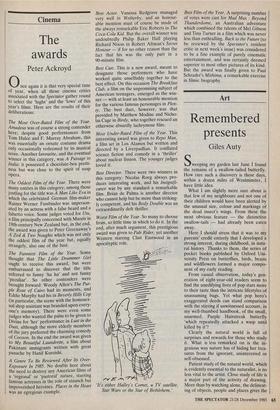Cinema
The awards
Peter Ackroyd
0 nce again it is that very special time of year, when all those cinema critics associated with the Spectator gather round to select the 'highs' and the 'lows' of this year's films. Here are the results of their deliberations: The Most Over-Rated Film of the Year. Amadeus was of course a strong contender here; despite good performances from Tom Hulce and F. Murray Abraham, this was essentially an ornate costume drama only occasionally redeemed by its musical score. Another favourite, and the eventual winner in this category, was A Passage to India: it possessed a chocolate-box pretti- ness but was close to the spirit of soap opera.
The Oddest Film of the Year. There were many entries in this category; among those jostling for the title was A Man Like Eva in which the celebrated German film-maker Rainer Werner Fassbinder was imperson- ated by an actress with a false beard and a falsetto voice. Some judges voted for Utu, a film principally concerned with Maoris in 19th-century New Zealand but, in the end, the award was given to Peter Greenaway's A Zed & Two Noughts which was not only the oddest film of the year hut, equally strangely, also one of the best.
The Funniest Film of the Year. Some thought that The Little Drummer Girl ought to receive this award, but were embarrassed to discover that the title referred to funny 'ha ha' and not funny `peculiar'. So other contenders were brought forward: Woody Allen's The Pur- ple Rose of Cairo had its moments, and Eddie Murphy had his in Beverly Hills Cop (in particular, the scene with the homosex- ual shop assistant was branded upon every- one's memory). There were even some judges who wanted the palm to be given to Divine for 'her' performance in Lust in the Dust, although the more elderly members of the jury preferred the charming comedy of Cocoon. In the end the award was given to My Beautiful Laundrette, a film about Pakistani immigrants written with great panache by Hanif Kureishi.
A Genre To Be Reviewed After Its Over- Exposure In 1985. No doubts here about the need to destroy any American films of a 'regional' or 'pastoral' nature, starring famous actresses in the role of staunch but impoverished heroines. Places in the Heart was an egregious example. Best Actor. Vanessa Redgrave managed very well in Wetherby, and an honour- able mention must of course be made of the always remarkable Eric Roberts in The Coca-Cola Kid. But the overall winner was undoubtedly Philip Baker Hall playing Richard Nixon in Robert Altman's Secret Honour — if for no other reason than the fact that his was the only part in a 90-minute film.
Best Cast. This is a new award, meant to designate those performers who have worked quite unselfishly together to the best effect. On this occasion The Breakfast Club, a film on the unpromising subject of American teenagers, emerged as the win- ner — with at least an honourable mention for the various famous personages in Plen- ty. The best duet, however, was that provided by Matthew Modine and Nicho- las Cage in Birdy, who together rescued an otherwise absurdly lachrymose film.
Most Under-Rated Film of the Year. This interesting award was given to Repo Man, a film set in Los Alamos but written and directed by a Liverpudlian. It conflated science fiction and comedy in a 'thriller' about nuclear fission. The younger judges loved it.
Best Director. There were two winners in this category: Nicolas Roeg always pro- duces interesting work, and his Insignifi- cance was by any standard a remarkable film..Brian de Palma is another director who cannot help but be more than striking- ly competent, and his Body Double was an extraordinarily deft thriller.
Worst Film of the Year. So many to choose from, so little time in which to do it. In the end, after much argument, this prestigious award was given to Pale Rider, yet another Western starring Clint Eastwood in an apocalyptic role.
'It's either Halley's Comet, a TV satellite, Star Wars or the Star of Bethlehem.' Best Film of the Year. A surprising number of votes were cast for Mad Max : Beyond Thunderdome, an Australian adventure which combined the talents of Mel Gibson and Tina Turner in a film which was never less than enthralling. Back to the Future (to be reviewed by the Spectator's resident critic in next week's issue) was considered to be a fine example of purely cinematic entertainment, and was certainly deemed superior to most other pictures of its kind. But the award was finally given to Paul Schrader's Mishima, a remarkable exercise in filmic biography.


















































































 Previous page
Previous page